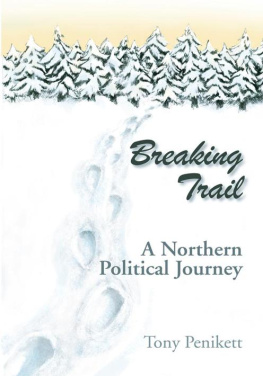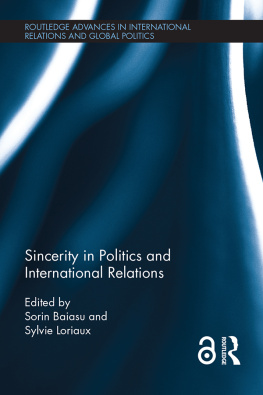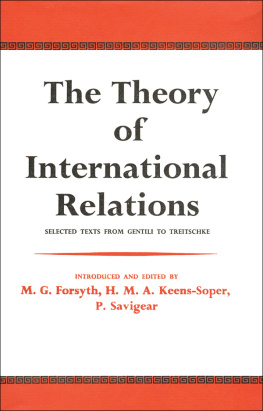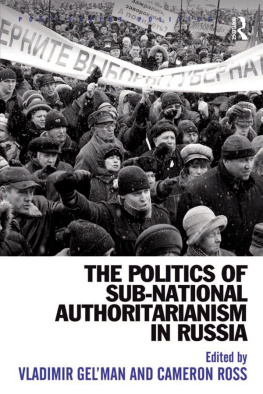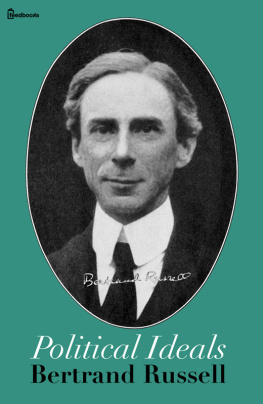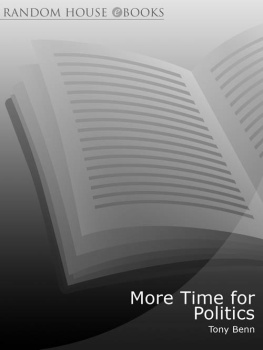Breaking Trail
A Northern
Political Journey
By Tony Penikett
Copyright 2004 Tony Penikett. All rights reserved.
No part of this publication may be reproduced, stored in a retrieval system, or transmitted, in any form or by any means, electronic, mechanical, photocopying, recording, or otherwise, without the written prior permission of the author.
A cataloguing record for this book that includes the U.S. Library of Congress Classification number, the Library of Congress Call number and the Dewey Decimal cataloguing code is available from the National Library of Canada. The complete cataloguing record can be obtained from the National Librarys online database at:
www.nlc-bnc.ca/amicus/index-e.html
ISBN: 1-4120-1461-1
ISBN: 978-1-4122-1817-7 (ebook)
TRAFFORD
_____________________
This book was published on-demand in cooperation with Trafford Publishing. On- demand publishing is a unique process and service of making a book available for retail sale to the public taking advantage of on-demand manufacturing and Internet marketing. On-demand publishing includes promotions, retail sales, manufacturing, order fulfilment, accounting and collecting royalties on behalf of the author.
Suite 6E, 2333 Government St., Victoria, B.C. V8T 4P4, CANADA
Phone 250-383-6864 Toll-free 1-888-232-4444 (Canada & US)
Fax 250-383-6804 E-mail
Web site www.trafford.comTRAFFORD PUBLISHING IS A DIVISION OF TRAFFORD HOLDINGS LTD. Trafford Catalogue #03-1839
www.trafford.com/robots/03-1839.html
10 9 8 7 6 5 4 3 2
Contents
Northern Solitudes:
Canadian Policy, Aboriginal Actors
and the Arctic Council
Mounties, Municipal Indians
and Canean Dancers
Blessed Are the Peacemakers:
Modern Treaty Making
with Aboriginal Nations
Learning Sustainability:
Lessons from Vukon 2000
Trudeaus Nobodies
(or Mapping a Constituency)
Globalization, Tech Change
and the Chambermaid
Shop Stewards, Company Towns
and the Canadian Community
Nature teaches us that magnificent forests and meadows full of beautiful flowers grow from the tiniest of seeds. Likewise, great events may have small beginnings. The roots of Canadas system of universal health care were sown in the small, impoverished province of Saskatchewan. Within a decade, medicare had become a national program. Over the last twenty years, Yukon, a tiny community, negotiated a number of pioneering agreements in its Indian land-claims negotiations and developed the first third-order form of aboriginal self-government in the country.
But that is not all. In its Education Act, human-rights legislation, environmental and language laws and child-care programs, the Yukon government in which I served was a leader in the development of Canadian public policy. The ministers and MLAs who made up that government were a remarkable group, and to them much credit is due.
However, it is also true that we found ourselves in the right place at the right time, from the mid-1980s through the early 1990s. The previous Conservative government had left us a sizeable surplus. We governed in a time of relative prosperity and served a citizenry ready for social change.
Many positive and enduring changes were the result. In addition to the aboriginal treaties and innovative laws, our government was able to build a new Yukon College campus as well as new schools and roads. For the first time, aboriginal people in significant numbers began to take part in Yukon governmental and other public institutions. The francophone community negotiated a new relationship with the territorial administration. All this contributed to what a visiting federal minister, Jean Charest, called a remarkable degree of social peace.
During the period, Yukon worked hard to improve its external relationships. The legislatures of Alaska, Yukon and the Northwest Territories began to make regular exchange visits. Yukon became a founding member of the Northern Forum, a circumpolar organization of regional governments. Whitehorse hosted the 8th International Congress on Circumpolar Health plus circumpolar conferences on agriculture and sustainable development.
In general, I believe our government left Yukon a better, healthier, more peaceful community. But, of course, we made our share of mistakes, and the electorate dismissed our government in 1992. Ten years later, I find it useful to reflect on my ideas about the North, aboriginal treaties, government and politics catalyzed in that era and since and to publish them in this collection. However, this is not an exercise in self-promotion. I am well aware of how fleeting political careers and political memories can be.
In 1979, in the summer following my election as the Member for Whitehorse West, I was walking down Main Street in our capital city. At Fourth Avenue, I met a man who only ten years before had been one of the great figures of territorial politics, a legislator whose name was rarely out of the headlines. Together, the retired politician and I walked to Second Avenue. Along the way, we passed dozens of people, but only two recognized and greeted my companion. It was an important lesson about the longevity of political reputations.
Merely weeks after a governments defeat, its members must watch a new administration begin dismantling programs that took years to establish. Swings in public opinion often produce radical shifts in public policy, and the former politicians must sometimes watch their most cherished projects probably being trashed. Sometimes, though, there are surprising survivors. Laws passed after acrimonious debate and close votes may endure, although nobody, it seems, can remember their author. The name on the plaque in the new public building is rarely that of the person who commissioned it. A monumental achievement like the Yukon land-claims agreement may be signed by politicians who contributed little to its successful negotiation. But that is how it goes in a democracy, which perfectly reflects the ideal that the office holder is simply the temporary holder of the public trust.
Truly, nothing could be more boring than has-beens recycling their old media clippings. The average government press release has a half-life of about an hour. All political controversies quickly become yesterdays news, what the poet Adam Zagajewski called the pettiness of daily newspapers. As the American cliche goes, a week is a long time in politics.
Even more transitory is the political speech. Writer Heather Robertson remembered growing up with the idea that government was about great men giving speeches to each other. But the age of great orators has passed; Winston Churchill, Martin Luther King and Tommy Douglas are all dead. Nowadays, major speeches are crafted by committees with only the evening news sound bite in mind. A political career without speechmaking is now a realistic possibility, especially in television cultures.
Yet in the Yukon pre-television political culture, speeches used to seem important and, in a small legislature like the Yukon Assembly, every member spoke often, some almost every day. The thousands of pages of Hansard, the dead record of Yukon legislative debates, include few great speeches. Perhaps great speeches require great audiences. For the most part, Yukon MLAs are talking only to each other, sometimes only to hear themselves speak. However, like the daily newspapers, they constitute an interesting history of exactly what people were thinking about on the day a particular speech was given.
So it is with the speeches and essays in this collection. On almost every subject, my views have evolved since the day the remarks were made. In some cases, my opinions have changed very significantly. However, I have no good reason to deny what I thought and said, ten, twenty and thirty years ago.
Next page
